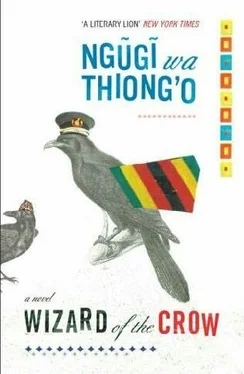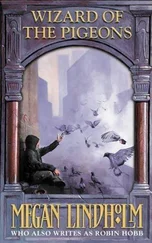The mushroom clouds forming near the State House after the seven cracks of thunder astonished everyone.
Upon seeing the helicopter in the sky, Sikiokuu had given his thugs the go-ahead to carry out the kidnapping of the wizard. Now he was looking for paper to attest to his support of the revolution. Up with the revolution, he wrote and posted his broadside on the windshield. He stared in wonder at the all-consuming smoke, swallowing even the helicopter. Though now a supporter of the revolution, he did not want to be caught in the crossfire between the revolutionaries and defenders of the current regime. In a coup d’etat, it was everybody for himself.
Everyone with a car was trying to flee the capital for the countryside. The congestion was frightening. Impatient horns blared. Visibility was impaired by the thick, foul smoke bedeviling those fleeing in cars and on foot. Covering the body of the Wizard of the Crow with her own, Nyawlra felt warm blood oozing. Please, Kamltl, please, don’t die on me, she begged.
Furyk and company ran down State House Road, with Kaboca at the rear shouting directions and urging them not to give up hope for, as he put it, they were only minutes away from the American haven.
Ambassador Gemstone had already given orders that any white person escaping the violence of the revolution should be let in without questions. Those in front entered the haven without any restraint. Wilfred Kaboca was the last to arrive, only to see the gates close before his eyes. Thinking that the guards did not understand, he banged the gate, shouting, We were together! They are my colleagues, you know! But they did not.
A bullet from inside the embassy felled Dr. Wilfred Kaboca. Too shocked to even moan, he somehow raised himself, his right hand on the left side of his chest trying to hold back blood, and amid the foul darkness he went to the highway to seek help to the hospital. No driver would stop. Dr. Kaboca, personal physician to the dictator of Aburlria, bled to death on the side of the Ruler’s Highway.
The following day people took courage and went to the grounds of the Parliament buildings and law courts, the site of the People’s Assembly. Bloated corpses were strewn here and there. It was hard to tell whether the vile stench was from this decomposition or from the dark mist of the day before, issuing from the State House. The mist had spread across the sky, shutting out the sun, the moon, and the stars, plunging the whole country into darkness, and even later, when the sun, the moon, and the stars were able to penetrate the darkness, the whole country seemed enveloped in a sickening pollution.
When official word about the thunder, smog, and carnage was not forthcoming, people started saying that maybe the Ruler was dead and the military had taken over the government, the truth of this seemingly borne out by the only visible face of the government: armored vehicles now and then patrolling the streets of the capital and major cities. A six-p.m. curfew had been put in place, but it was not strictly enforced and nobody was arrested for ignoring it.
But why was the military not being forthright about assuming power? Some argued for a failed coup led by noncommissioned officers displeased with their wages like everybody else. Though the coup had failed, a bullet had struck the Ruler, who was now in hiding, giving his wound time to heal. Others said, No, he is merely playing mind games. Have you forgotten that other time, not so long ago, when he let out rumors that he was suffering from throat cancer, only to emerge from his seclusion to heap scorn on all who had prematurely celebrated his death? Did he not also do this and that? Every story was dissected, reinvented, reinterpreted, many times over, because people had no hard facts on which to base a true account of what had happened at the State House. Some claimed, without disclosing their sources, that after the first or second explosion, seven or eight white men were seen running from the State House, a black man giving chase, followed at some distance by black youth, and when the white men reached the American embassy, the gates were opened and the white men entered but the black man was left outside, wagging his finger at them, accusing them of having bombed the State House. The black man was shot and the youth who had been following fled the scene. The black man was never seen again, and neither, for that matter, were the seven or eight whites.
The more the unbearable stench of the foul smog suggested environmental disaster, the more frustration, anger, and fear grew. In every village in every region all over the country, people began to demand that the government tell the truth; there was even talk of resuming demonstrations. Religious leaders called for a day of prayer, and workers for a general strike. Multiparty democracy now became the new clarion call. Soon word was out: the Ruler would not come out in the open because he was scared of Mr. Multiparty.
The Global Bank released a statement that the current absence of leadership and the recent mysterious happenings were putting serious doubts in the minds of investors about the political stability in the country.
It was Big Ben Mambo, Minister of Information, who broke the news: the Ruler had set a date when he would address Parliament and the nation, to be carried live on radio and television. Newspapers were told to plan for special editions, because the Ruler would be announcing a special gift from himself to the nation.
Big Ben Mambo’s statement served only to stir the pot: what about the Ruler’s rumored illness? Since coming back from America, the Ruler had not appeared in public: why now? What had prompted this unlikely promise of generosity? And the unthinkable: was he about to abdicate?
Parliament was packed. The cabinet, members of Parliament, and even some foreign diplomats had arrived hours before the appointed time. The media, in full fever, hoped to glean anything that might make sense of the great Aburlrian mystery: the seven cracks of thunder and the unimaginable smog. American television, which had refused to grant the Ruler an interview when he was in America, now begged for an exclusive with the Ruler. Anyone with a radio or television was glued to his set, crowded by those without.
The speaker of the house struck the table with a mallet. The eagerly awaited session was about to begin.
“True, Haki ya Mungu, I kept wondering how he would come to the Parliament,” said A.G. “What carriage was he going to ride in? How would he enter the building, for I had not heard anything about the doors being enlarged. Would he be pushed through the entrance the way he was once squeezed into the jumbo jet? What would he talk about? Would he mention the fate of the Wizard of the Crow? And what would he say about the rumors of his pregnancy? Questions upon questions…”
Some workers had taken the afternoon off, a few unofficially, for nobody wanted the news to pass him by. A.G. knew of a tea shop, Wvra-no-nda, with a television, and he got there early only to find that others had gotten there before him, but he positioned himself where he could see the screen clearly. All crowded around the television set the way bees swarm around a hive, buzzing. When they saw the Ruler appear, they fell silent.
The Ruler entered Parliament and walked down the aisle on a red carpet. To his right was a woman dressed magnificently, wearing a diamond tiara. Was Rachael, the Ruler’s wife, being trotted out for a public viewing?
A.G. could hardly believe his eyes. This Excellency on television was hardly the Excellency he had last seen at the State House. This Excellency was tall and thin. He was dressed in a dark suit, with a boutonniere, a white handkerchief in the breast pocket. In his left hand he held a club and a fly whisk. The usual patches of leopard skins were there. His head was the size of a fist, but his eyes bulged, resembling the late Machokali’s.
Читать дальше












